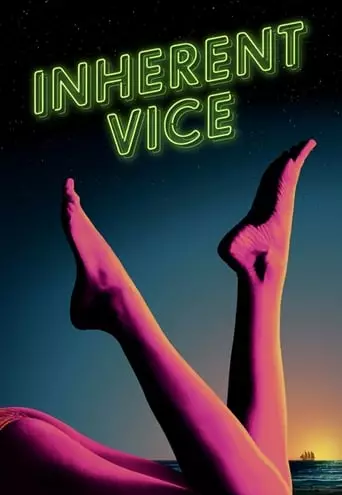In Los Angeles at the turn of the 1970s, drug-fueled detective Larry “Doc” Sportello investigates the disappearance of an ex-girlfriend.
Inherent Vice is a neo-noir film directed by Paul Thomas Anderson, based on the 2009 novel by Thomas Pynchon. Set in 1970s Los Angeles, the film follows private investigator Larry “Doc” Sportello (Joaquin Phoenix) as he navigates a chaotic, drug-fueled world in search of his ex-girlfriend Shasta Fay Hepworth (Katherine Waterston). Doc is drawn into a convoluted case when Shasta asks him to investigate the disappearance of her new lover, real estate mogul Mickey Wolfmann (Eric Roberts).
As Doc digs deeper, he uncovers connections between his case and a larger conspiracy involving corrupt police officers, drug cartels, and a mysterious organization known as the Golden Fang. Along the way, he crosses paths with eccentric characters, including the hard-boiled cop Bigfoot (Josh Brolin), who becomes both a foil and an unlikely ally. As the mystery unfolds, Doc faces betrayals, convoluted plots, and a complex underworld, all while trying to reconnect with Shasta and wrestle with his own feelings of loss.
The film’s fragmented narrative and surreal quality capture the essence of Pynchon’s novel, with Doc navigating through a world that constantly blurs the line between reality and illusion, culminating in a melancholic reflection on the passage of time and lost love.
Themes in Inherent Vice
- The End of an Era: The film captures the decline of the 1960s counterculture and the dawn of the more cynical 1970s. It explores the inevitable changes and loss that accompany societal shifts, both in the world at large and in the personal lives of the characters
- Nostalgia and Loss: Doc’s yearning for Shasta represents a larger sense of nostalgia for a lost time. The characters, especially Doc, are haunted by their pasts, trying to recapture something that’s already gone. The film delves into the sadness and futility of this pursuit
- Corruption and Power: The Golden Fang, a shadowy organization in the film, symbolizes the corrupting influence of power and money, and the film critiques the systemic corruption present in both law enforcement and business
- Identity and Paranoia: In typical Pynchon fashion, the film examines themes of identity crisis and paranoia. Characters frequently question their roles in a chaotic world, unsure of who they can trust and whether they’re being manipulated
Reasons to Watch Inherent Vice
- Unique Visual Style: Paul Thomas Anderson’s direction brings the surreal world of Pynchon to life with intricate cinematography, capturing the disorienting, kaleidoscopic nature of the story.
- Stellar Cast: Joaquin Phoenix’s portrayal of Doc Sportello is both comedic and tragic, while Josh Brolin delivers a standout performance as the tough, conflicted Bigfoot.
- Complex Narrative: The plot is intricate and multi-layered, offering a challenging yet rewarding experience for those who enjoy puzzle-like storytelling.
- Cultural Reflection: The film is a fascinating snapshot of the late 1960s and early 1970s, exploring the end of the idealistic counterculture and the rise of a more disillusioned society.
- Surreal Humor: Anderson’s signature blend of humor and absurdity is woven throughout the film, providing moments of levity amid the otherwise heavy themes.
- Adaptation of Pynchon’s Work: The film is one of the most faithful adaptations of a Pynchon novel, capturing the essence of his dark, humorous, and philosophical style.
- Rich Character Development: Each character is complex and flawed, contributing to the film’s depth and emotional resonance.
- Engaging Soundtrack: The film features a mix of 1970s rock and melancholic scores, which add to the atmosphere and thematic exploration of nostalgia.
- Clever Dialogue: True to Pynchon’s form, the film is full of sharp, witty dialogue that offers insight into the characters’ psyche and the world they inhabit.
- Thought-Provoking Themes: Inherent Vice encourages viewers to reflect on themes like love, loss, and the passage of time, making it a film that lingers long after viewing.
How You Will Feel After Watching Inherent Vice
After watching Inherent Vice, you may feel a blend of confusion and melancholy. The film’s dense, often perplexing plot might leave you with more questions than answers, especially regarding its symbolic elements and the fate of its characters. However, this ambiguity is part of the experience, as it mirrors the sense of disillusionment and uncertainty that permeates the 1970s counterculture. The melancholic ending, where Doc finds a fleeting sense of closure despite the unresolved nature of his relationship with Shasta, is bittersweet. You’ll likely feel a sense of longing for a time or love that can never truly be recaptured, and a sense of appreciation for the film’s quirky humor and unique visual style.
In essence, the film provides an introspective and slightly melancholic experience that leaves you contemplating its deeper meanings long after the credits roll

